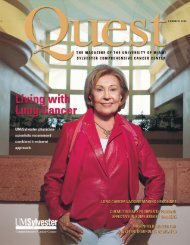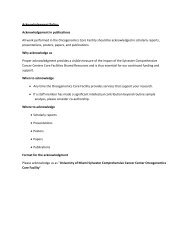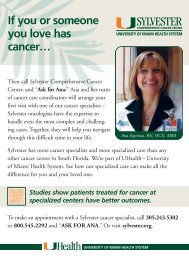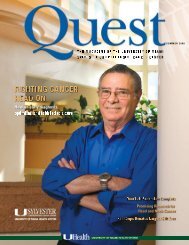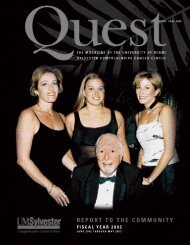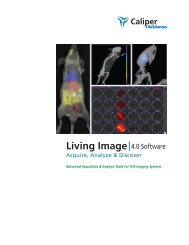SCIENTIFIC REPORT 2004 - Sylvester Comprehensive Cancer Center
SCIENTIFIC REPORT 2004 - Sylvester Comprehensive Cancer Center
SCIENTIFIC REPORT 2004 - Sylvester Comprehensive Cancer Center
Create successful ePaper yourself
Turn your PDF publications into a flip-book with our unique Google optimized e-Paper software.
V I R A L O N C O L O G Y P R O G R A M<br />
GOALS OF PROGRAM<br />
1) Investigate the regulation of programmed cell<br />
death, membrane transport, interferons,<br />
cytokines, and viral and cellular gene expression<br />
in cancers that arise in immunocompromised<br />
patients.<br />
2) Devise novel therapeutic strategies for therapy<br />
of viral malignancies.<br />
3) Train investigators in the field of viral oncology<br />
and extend our basic and clinical studies<br />
to developing nations with a high incidence of<br />
viral-induced malignancies.<br />
PARTICIPANTS<br />
Barber, Glen N., Ph.D.<br />
Microbiology and Immunology<br />
Boehmer, Paul E., Ph.D.<br />
Biochemistry and Molecular Biology<br />
Boise, Lawrence H., Ph.D.<br />
Microbiology and Immunology<br />
Byrne, Jr., Gerald E., M.D<br />
Pathology<br />
Fontoura, Beatriz M.A., Ph.D.<br />
Molecular and Cellular Pharmacology<br />
Harhaj, Edward W., Ph.D.<br />
Microbiology and Immunology<br />
Harrington, Jr., William J., M.D.<br />
Medicine<br />
Mian, Abdul M., Ph.D.<br />
Medicine<br />
So, Antero G., M.D., Ph.D.<br />
Medicine<br />
HIGHLIGHTS<br />
Basic/Translational Research<br />
• Glen N. Barber, Ph.D., and his colleagues study<br />
the mechanisms of host defense against viral<br />
and malignant disease. Their research focuses<br />
on elucidating the mechanisms of interferons<br />
including their role in regulating apoptosis.<br />
These researchers recently have demonstrated<br />
that vesicular stomatitis virus (VSV), an essentially<br />
nonpathogenic negative-stranded RNA<br />
virus, can selectively induce the cytolysis of numerous<br />
transformed human cell lines in vitro.<br />
The ability of these viruses to selectively kill<br />
tumor cells and not normal cells was dependent<br />
on the protein kinase R/interferon (PKR/IFN)<br />
pathway being defective in susceptible cells.<br />
They have now demonstrated in vivo that tumors<br />
defective in p53 function or transformed<br />
with myc or activated ras also are susceptible to<br />
viral cytolysis, and that the mechanism of viral<br />
oncolytic activity involves the induction of multiple<br />
caspase-dependent apoptotic pathways.<br />
Furthermore, VSV caused significant inhibition<br />
of tumor growth when administered intravenously<br />
in immunocompetent hosts. Their findings<br />
suggest that VSV could be used as a<br />
potential oncolytic agent against a wide variety<br />
of malignant diseases associated with a diversity<br />
of genetic defects. Extensions of this work now<br />
include engineering VSV to express proteins<br />
from viruses associated with cancer such as<br />
hepatitis C (HCV) and human papilloma virus<br />
(HPV) for vaccine and therapeutic purposes.<br />
For example, chimeric VSV containing HCV<br />
structural proteins is being examined as a therapeutic<br />
or preventative vaccine.<br />
• William J. Harrington, Jr., M.D., investigates<br />
the use of antiviral agents in viral-induced malignancies.<br />
He has found that antiviral thymidine<br />
analogues such as azidothymidine (AZT)<br />
and IFN α induce marked apoptosis in Epstein-<br />
Barr virus (EBV) and human herpes virus type<br />
8 (HHV-8)-associated primary effusion lymphomas<br />
(PELs). This therapy was very effective<br />
in eradicating AIDS-related brain lymphoma<br />
and formed the basis for a nationwide clinical<br />
130<br />
UM/<strong>Sylvester</strong> <strong>Comprehensive</strong> <strong>Cancer</strong> <strong>Center</strong> Scientific Report <strong>2004</strong>





